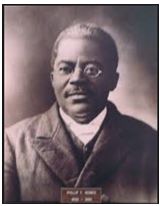Religion and spirituality were central to Black life in 19th and 20th century Lynchburg. Old City Cemetery reflects the deep faith of many of its residents, from the traditional Christian east-west orientation of graves to the frequent Biblical references on tombstones.

Rev. Phillip Fisher Morris
The cemetery is the final resting place for many of the founders, pastors, trustees, deacons, stewards, and other leaders of local Black churches. Perhaps the most prominent among them is Rev. Phillip Fisher Morris (1852–-1923). Rev. Morris was born enslaved in eastern Virginia but earned multiple degrees from Howard University. He moved to Lynchburg in 1881 to pastor the city’s largest African American congregation, Court Street Baptist Church. When the congregation split in 1898, he led a faction to form Eighth Street Baptist Church. Morris was also the founding president of Lynchburg’s oldest college, Virginia Seminary (now Virginia University of Lynchburg), 1888–1891.
The extent to which Whites and enslaved or free Blacks worshiped together in the early nineteenth century is unclear, but the origins of Court Street Baptist may offer a clue. In the first decades of the nineteenth century, Blacks and Whites worshiped together at First Baptist Church. This may have been due, in part, to the preference of White slave owners to keep their slaves close at hand during worship. As the enslaved population grew, a separate Sunday afternoon service was provided for Blacks. Separate church histories indicate that in 1833 or 1843, the vestry of the church purchased the nearby Theater Hall for use as a separate church for Black people, called the “African Baptist Church” of Lynchburg. As required by state law, White pastors were provided to this church until after the Civil War. After the war, the congregation ceased its affiliation with First Baptist Church, called an African American pastor, and renamed itself Court Street Baptist Church. Court Street Baptist later birthed many other Black Baptist churches in the Lynchburg area.
From their earliest days, Black churches have been central to the social, cultural, and political life of the Black community. Church leaders often function as de facto community leaders. Many of the pastors, deacons, deaconesses, stewards and trustees of these churches are buried in this area and across the cemetery. Among them are:
Daniel A. Butler (trustee)
Royal Pleasant Butler (deacon)
Willie Reid Hayes (deaconess)
Squire C. Higginbotham (trustee)
Thomas Isbell (deacon)
Phillip Fisher Morris (minister)
Robert A. Perkins (trustee)
Armistead Pride (trustee)
Claiborne Gladman Pride, Sr. (trustee)
Warwick Spencer, Sr. (trustee)
Patrick Henry Cabell (trustee)
Frank Trigg, Jr. (trustee)
Elias Whitlock (trustee)
Frank Brown Woodard (minister)
